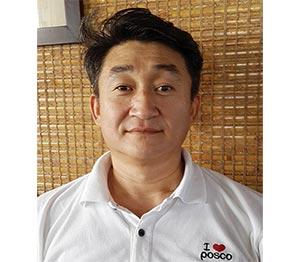Posco head talks solutions to local steel sector woes
 |
Domestic steel firms are struggling as the market continues to suffer from acute oversupply. Many steel firms have reported losses in the first three quarters of this year. How has your company fared?
We are trying our best to overcome this trough. Our customers also face difficulties and the domestic steel sector has had to compete fiercely with the imported steel which has been exempted from import tariffs.
We suffered losses in the third quarter of this year, but I’m obviously not going to go into too much detail about our business operations.
Vietnam has levied an anti-dumping tariff on imported cold-rolled stainless steel from China, Malaysia, Indonesia, and Taiwan following petitions from South Korea’s Posco VST Co. Ltd and locally-owned Hoa Binh Joint Stock Company. However, there are some concerns that Posco may increase your prices to offset the losses, is that true?
Anti-dumping actions are a measure to rectify the situation in which these goods have affected the domestic market. The purpose of an anti-dumping duty is to rectify the effects caused by dumping cheap products and help re-establish fair trade. The use of anti-dumping measures as an instrument to promote fair competition is permitted by the World Trade Organization (WTO).
Bach Van Mung, head of the Vietnam Competition Authority under the Ministry of Industry and Trade (MoIT) also said that Vietnam has tools to deal with unfair price rises. We anticipate selling more to make up for the losses; we’re not interested in unreasonably hiking our prices.
Posco SS-Vina, a subsidiary of Posco Steel, said it would not be able to open its under-construction steel-making factory in the southern province of Ba Ria-Vung Tau as scheduled, because of a power supply delay. How’s the current status?
Posco SS-Vina began construction on its $600 million plant in 2012. The facility is designed to produce one million tonnes of shape steel and reinforced steel per year. We have actually finished the construction. According to our initial plan, we were set to begin operations in July, however the facility wasn’t supplied with electricity as promised.
The MoIT said that the power supply was good. The problem here is the transmission line to the facility. Deputy Prime Minister Hoang Trung Hai ordered the MoIT, the state-run Electricity of Vietnam and the Ba Ria-Vung Tau Provincial People’s Committee to find ways to ensure that power was supplied to Posco SS-Vina on time. We hope that by December 15 the facility will begin operation.
Posco holds about 40 per cent of Vietnam’s stainless steel market share. Vietnam is going to integrate into the Asean Economic Community (AEC) by the end of next year and sign a free trade agreement with Russia, so will this affect your prospects and what plans do you have to deal with the increased competition?
Quality remains our paramount concern. We will maintain quality and try to reduce product costs. We will also create more value for customers through solution marketing.
Solutions provided from the steel industry comes in the form of a combination of rolled steel (hardware) and utilisation technology (software) which can be modified based on market situations and customer demands. By offering such solutions, Posco is looking towards not only meeting customer demands but also to greater profitability by aggressively expanding sales of high-grade steel. We are building our Southeast Asia solution centre in Ho Chi Minh City.
Could you give a brief outline of your plans for Vietnam and what you believe the prospects for the steel sector are in the coming period?
We have no specific projects in the coming time, but we started investing in Vietnam back in 1992 with our Posvina project and Posco has now invested in projects capitalised at $2 billion so far. Most of Posco’s investment projects in Vietnam are in steel manufacturing. Since entering Vietnam, Posco has adhered to our business creed - “Making steel for the country’s development”.
In the coming time, Vietnam’s steel sector will recover and the steel volume per capita in Vietnam will need to increase 130 kilogrammes and to 200-300kg if the country wants to become an industrialised nation. The Vietnamese government still needs to carefully revise measures to protect the domestic market. Other countries participating in free-trade agreements also need to take measures to protect themselves.
What the stars mean:
★ Poor ★ ★ Promising ★★★ Good ★★★★ Very good ★★★★★ Exceptional
Latest News
More News
- Hermes joins Long Thanh cargo terminal development (February 04, 2026 | 15:59)
- SCG enhances production and distribution in Vietnam (February 04, 2026 | 08:00)
- UNIVACCO strengthens Asia expansion with Vietnam facility (February 03, 2026 | 08:00)
- Cai Mep Ha Port project wins approval with $1.95bn investment (February 02, 2026 | 16:17)
- Repositioning Vietnam in Asia’s manufacturing race (February 02, 2026 | 16:00)
- Manufacturing growth remains solid in early 2026 (February 02, 2026 | 15:28)
- Navigating venture capital trends across the continent (February 02, 2026 | 14:00)
- Motivations to achieve high growth (February 02, 2026 | 11:00)
- Capacity and regulations among British areas of expertise in IFCs (February 02, 2026 | 09:09)
- Transition underway in German investment across Vietnam (February 02, 2026 | 08:00)
















 Mobile Version
Mobile Version